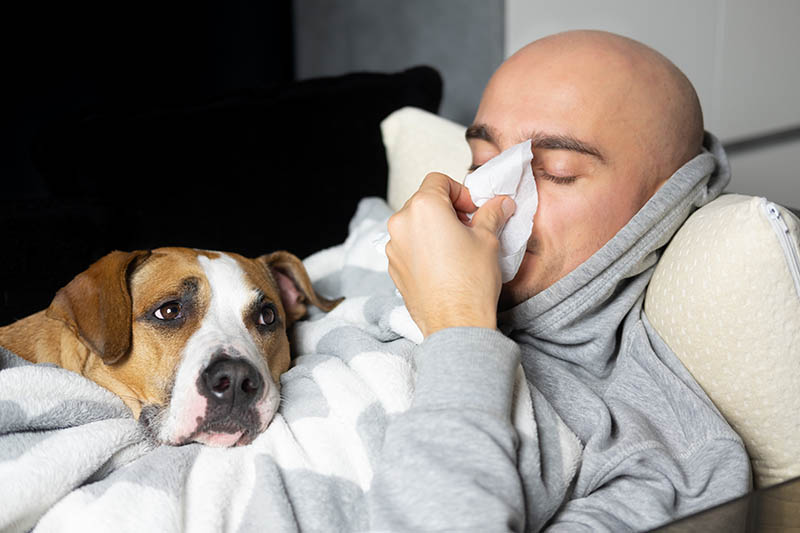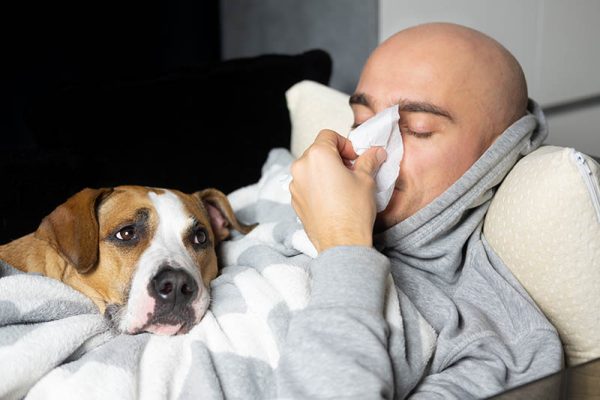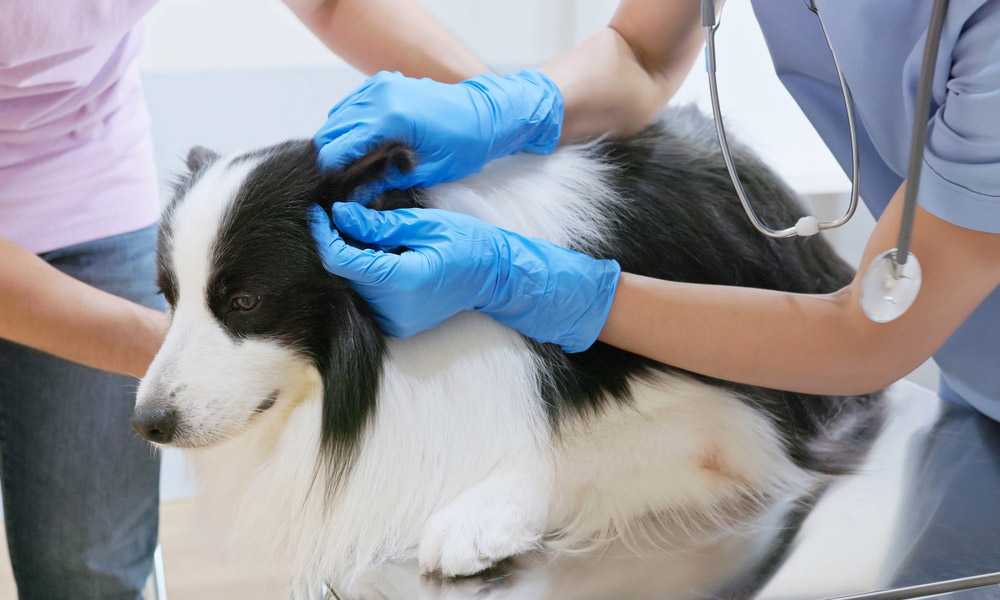Pets can pass diseases to people in a process called zoonosis. But can we pass germs to our dogs and make them sick? Yes, we can! Dogs can indeed get sick from humans. That said, while dogs can catch germs from us, this is less common than pets making us sick. Viruses, bacteria, fungi, and parasites can all be shared between animals and people. Read more to find out which diseases we can pass on to dogs and how to keep your pets safe.
The 7 Diseases Dogs Can Get From Humans
1. Common Cold and Flu
While cold and flu viruses can easily pass from person to person, dogs are more resistant. However, it is still possible for your dog to catch a cold or the flu from you or a family member in close proximity. Cold viruses are more species-specific, meaning it is rare or unlikely that your dog will catch the sniffles from you.
Flu viruses, however, are a bit more indiscreet about who they infect, and they readily mutate to infect different species of animals (e.g., swine flu, avian flu, etc.). Dogs have their own flu virus, known as canine influenza, that is contagious to other dogs, though there have not been any reported cases in humans.
The flu virus primarily affects the respiratory system. Signs of the flu in dogs include sneezing, coughing, runny nose, eye discharge, decreased appetite, and fever. Some dogs show no signs at all, while others may develop a more severe illness that can lead to pneumonia. Most dogs recover in 2–3 weeks, but if you have concerns about your dog’s health, contacting your veterinarian is recommended.
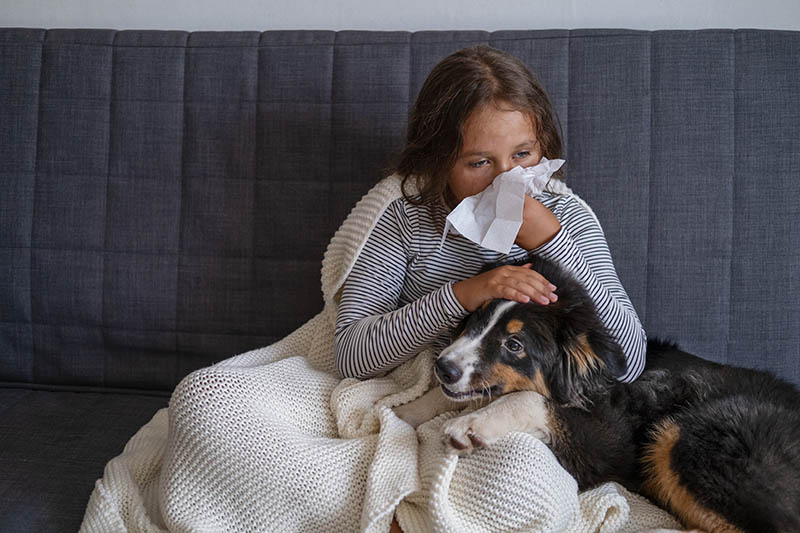
2. COVID-19
There have been reported cases of dogs catching COVID-19 from their infected pet parents. That said, dogs are not easily infected. Close contact, such as hugging, kissing, and sharing food with your dog while sick with COVID-19, may transmit the virus. Signs of COVID-19 in dogs include sneezing, coughing, eye and nasal discharge, fever, lethargy, difficulty breathing, vomiting, and diarrhea. Most dogs have mild signs and improve with supportive care at home.
3. Giardia
This protozoan is a parasitic disease that is passed on through feces and contaminated water sources. Dogs are susceptible to catching Giardia from people after they drink from water sources shared by humans, including swimming pools, spa water, lakes, and streams. Signs of Giardia in dogs include diarrhea and weight loss. It is typically treated with an antiparasitic medication, such as fenbendazole.
4. MRSA
Methicillin-resistant Staphylococcus aureus (MRSA) is a bacterium that has become resistant to many antibiotic treatments. It typically causes skin infections but may also cause pneumonia and infection of the bloodstream (sepsis). Dogs may become infected with MRSA if their pet parents work in a healthcare setting where the disease is prevalent or if their owner is actively infected with it.
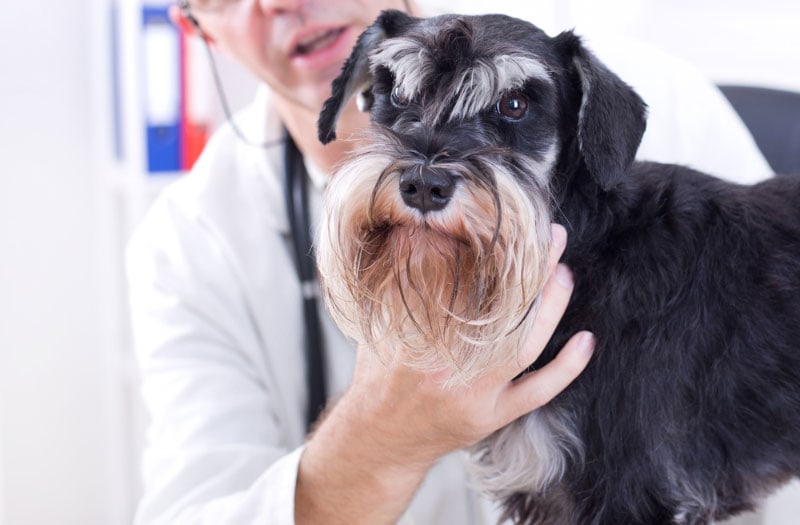
5. Mumps
Dogs can catch the mumps virus from infected people, though the risk is low. Signs in dogs include fever, lethargy, swollen salivary glands, and decreased appetite. Most dogs recover in 5–10 days and may need supportive care at home, as there is no specific treatment available for dogs.
6. Ringworm
Ringworm is a fungal infection of the skin that can be passed from pets to people and vice versa. Signs of ringworm in dogs include rounded patches of hair loss that may or may not be itchy. Besides catching ringworm from pet parents through direct contact, dogs can also get it through contaminated brushes or bedding. Ringworm infections in dogs can be treated topically with an antifungal ointment, dips, or shampoo, and/or they can be treated systemically with oral pills or liquid medication if needed. You can prevent transmitting ringworm to your dog by keeping ringworm lesions covered.
7. Salmonella
Dogs can become sick with Salmonella after drinking from the toilet or eating foods contaminated with the bacterium, including food from the trash. Signs of Salmonella poisoning in dogs include nausea, vomiting, diarrhea, and fever.

Tips for Keeping Your Dog Healthy and Safe
- Always wash your hands before and after interacting with your dog, especially when you are sick and after using the restroom.
- Wear a mask that covers your nose and mouth if you have mumps, a cold, the flu, or COVID-19.
- Limit contact with your dog, if possible, when you are fighting an illness.
- Avoid close contact with your dog, including hugging them, kissing them, and sharing food with them when you are sick.
- Have a healthy family member or trusted neighbor care for your dog when you are ill.
- Avoid letting your dog drink from the toilet and get into the trash.
- Always contact your veterinarian if you have concerns about your dog’s health.
Final Thoughts
People may pass illnesses to their dogs, but this is less common than dogs making us sick. A few diseases, such as the flu virus, COVID-19, the mumps virus, ringworm, and parasitic and bacterial infections, can be transmitted to dogs, albeit rarely. Taking precautions around your pets if you are sick, including frequent handwashing and avoiding close contact, can help reduce the risk of spreading a disease. Any health concerns regarding your dog should be discussed with your veterinarian.
Featured Image Credit: Aleksey Boyko, Shutterstock

